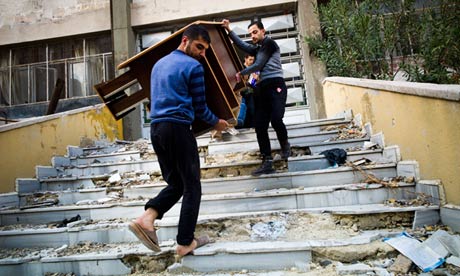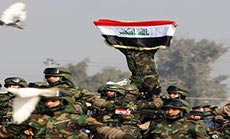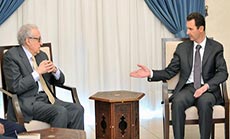The Guardian: Syria Rebels Loot, Feud, Suffer Divisions

Local Editor
They are the supposed Syrian rebels, and it is the so-called the revolution.
However, as time passes the rebels turned to be looters and autocrats and the revolution is simply an aggression against the Syrian people.
In this context "The Guardian" daily reported some of the scenes of rebels' offenses in Aleppo.

"The motive for his murder lay in a great warehouse in Aleppo which his unit had captured a week before. The building had been full of rolled steel, which was seized by the fighters as spoils of war," it added.
The daily further detailed: "But squabbling developed over who would take the greater share of the loot and a feud developed between commanders. Threats and counter-threats ensued over the following days. Abu Jameel survived one assassination attempt when his car was fired on. A few days later his enemies attacked again, and this time they were successful. His bullet-riddled body was found, handcuffed, in an alley in the town of al-Bab."
"There is not one government institution or warehouse left standing in Aleppo. Everything has been looted. Everything is gone," one of the rebel leaders admitted.
According to Hussam and other commanders, and fighters interviewed by the Guardian over a fortnight in northern Syria, "a new phase has been reached in the war. Looting has become a way of life."
"Spoils" have now become the main drive for many units as battalion commanders seek to increase their power.
One pharmacist unveiled some of the lootings: "The rebels had taken over the warehouse of a leading pharmaceutical company and then had resold the stock back to the owners, shipping all the drugs back into government-held territory."
He added: "I went to the warehouse to tell them they had no right to the medicine and that it should be given to the people and not re-sold. They detained me and said they would break both my legs if I ever went back."
In Saif al-Dawla district a rebel commander who was furnishing a new headquarters for his newly formed battalion walked into a school compound with a few of his men.
A group of civilians stood watching in the late afternoon as the men trawled through the school. The men ferried some of the tables, sofas and chairs outside the school and piled them up at the street corner. Computers and monitors followed.
Later in the week, the daily's correspondent saw the school's sofas and computers sitting comfortably in the commander's new apartment.
"The rebels wanted to take revenge on the people of Aleppo because they felt that we had betrayed them [in reflection of Aleppo's loyalty to the Syrian President Bashar al-Assad]," Abu Ismael told the Guardian.
He also added: " In the first month and a half the rebels were really a united revolutionary group. But now they are different. There are those who are here only to loot and make money, and some still fight."
On another level, the daily mentioned that "The rebels in Aleppo are not only funded by what can be appropriated by the various units, but also by the patronage that they can attract from sponsors outside Syria."
"Brothers, we have a grave situation ahead of us," interjected Abdul-Jabbar Akidi, a colonel who leads the so-called military council of Aleppo.
"The battle has stagnated here," he said. "There has been no real progress on the fronts and that has affected our sponsors, who haven't been sending us ammunition."
In parallel, Akidi confessed: "Even the people are fed up with us. We were liberators, but now they denounce us and demonstrate against us."
"The problem is not with the people. The problem is us! We have battalions sitting in areas who man checkpoints and detain people. They say this person is a shabiha [a government man] and take his car, or that man was a Ba'athist, take his house," a young man said.
He noted: "They have become worse than the regime. Tell me why those men are in the city, why are they not fighting at the frontline?"
Source: The Guardian, Edited by moqawama.org
Comments

France’s Hollande in Qatar for Warplane Deal
9 years ago
Iraq Police Dismantles Al-Qaeda Protest Site
10 years ago

